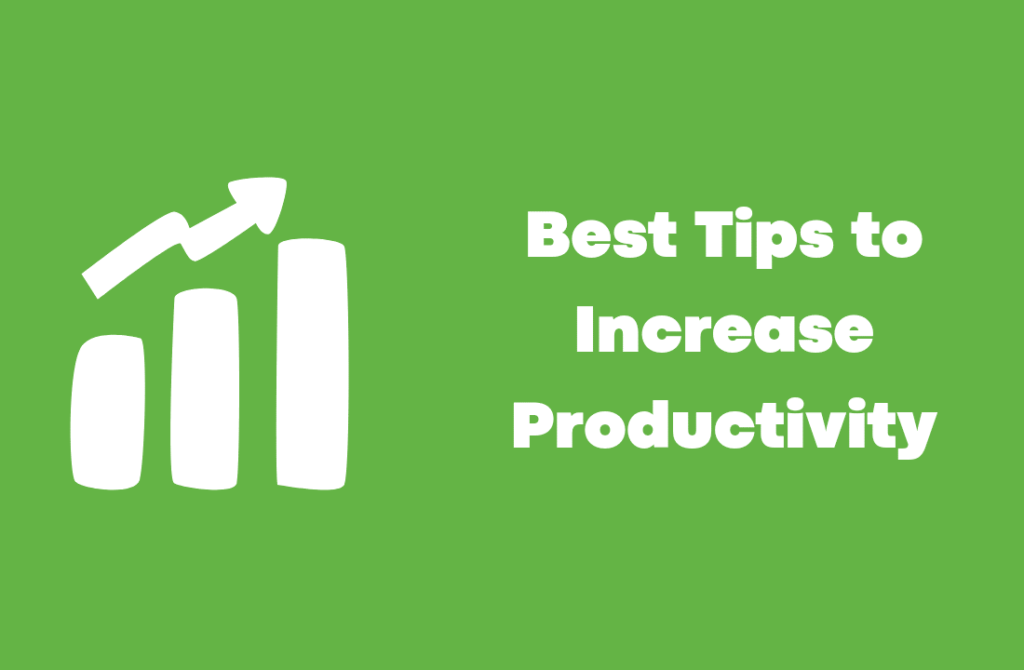Do you ever feel like you didn’t get everything on your to-do list at the end of the day? You begin with a plan, a list, and a goal… But by the end of the day, your to-do list has grown even longer.
I understand. It might be challenging to be productive. It is critical to managing your time in ways that promote productivity. However, it might be difficult to know where to begin. In this article, we will talk about some tips to increase your productivity.
Table of Contents
Let’s start with understanding the term Productivity
Productivity is a measure of a person’s efficiency in completing a task. We frequently believe that productivity is getting more things done each day. Wrong. Productivity is the constant completion of vital tasks. And there are just a few things that are actually crucial no matter what you are working on. Productivity is the key to success. It is a measure of how much work we are able to accomplish in a given time.
Being productive means running a few things at a consistent, average speed rather than going full throttle on everything.

The primary definition of productivity is achieving the desired outputs with less time and effort. When you’re looking for ways to be more productive, what you’re actually looking for is a means to reach your objectives while still having time to concentrate on what matters.
We’d all like to know how to boost productivity and improve our time management skills in order to live more productive and satisfying lives. But, no matter how hard we try, we can’t help but be sidetracked by everything, everywhere.
There’s always a way to procrastinate and squander time, whether you’re a student or a professional on the job, and that to-do list you were so sure you’d accomplish by the end of the day just goes out the window. You go home at the end of the day with a sense of self-doubt and dissatisfaction, knowing you could have accomplished more if you had simply concentrated harder and been less distracted.
Productivity, on the other hand, is dependent on mental energy, motivation, and awareness. It frequently appears when you are naturally enjoying what you are working on.
Tips to Increase your Productivity

With just so much time in the day, productivity is critical. Putting in more time or working smarter is the key to getting better outcomes. Managing your time more intentionally isn’t a magic solution, but it may help you become more productive at work.
Even incorporating a few time-saving tactics into your routine should make you feel more productive in general.
Productivity is all about efficiency, effectiveness, and getting things done. The productivity tips below will help you get more done and enjoy the process.
- Set goals and deadlines:
Goals are what you want to achieve and deadlines are the time when you want to achieve them. When you have a goal, it is easier for you to focus on what needs to be done in order for it to happen. You also need a deadline because that will help you stay focused on what needs to be done by that date.
Are you ready to put these ideas into action and become more deadline-driven? Use these suggestions to help you plan your goals and set deadlines.
- Make a calendar entry for each stage. Set deadlines for each of these phases to guarantee that everything is accomplished before the final deadline. This will keep you from delaying and failing to meet deadlines.
- Make use of a timer. Keep track of time and avoid working too slowly.
- Establish your priorities. Begin by determining which stages are most crucial in accomplishing your academic goal and determining whether there are any methods to save time. If time is short, determine which pieces you can skip or do fast.
- Do the most challenging tasks first. Getting the most difficult tasks completed might boost your drive and speed up the rest of the job.
- Create an action plan:
An action plan helps us break our tasks down into smaller parts so that they can be completed one step at a time, instead of all at once which can cause overwhelm or stress.
A well-thought-out action plan may help you stay on track and achieve your objectives. Whether you have a career, company, or personal objective, an action plan may help you chart a course to success. The amount of depth in your action plan might vary depending on your available resources and the complexity of your project or objective.
Writing an action plan may appear difficult, but it is well worth the effort to keep yourself focused later on, and adopting a simple structure will assist offer you clarity. While tasks and dates may change, action plans usually follow the same structure and include the same sorts of information. Follow these five steps to creating an action plan to help you reach your goal:
- Set SMART objectives.
- Make a list of possible actions.
- Make a timetable.
- Allocate resources.
- Keep an eye on things.
Trying to find out your strengths and weakness, do try our genetic brain profiling service which will tell you everything about yourself that even you don’t know, and book a counseling session with Gyaannirudra’s expert career counselor for personalized step-by-step advice on your career exploration journey.
- Be realistic about your workload:
It’s important for us not only set goals but to be realistic about the workload that those goals may require. Create a schedule and break down your workload into manageable segments. A schedule gives us a sense of how we can work towards our goal and helps with doing this one step at a time.
Here are some strategies to help you enhance your productivity, and properly prioritize your workload.
- Organize your workload
To avoid switching between chores, it is preferable to tackle each item on your list one at a time. Of course, we can’t help but multitask at times, but by properly arranging your workload and focusing on each activity independently, you’ll be able to accomplish your list more effectively and without your mind straying.
- Set reasonable deadlines
It is critical to precisely estimate the time each activity will take you to complete in order to achieve and feel satisfied at the conclusion of your working day. Being too hopeful can only lead to disappointment.
- Regularly assess your workload
I need to evaluate my to-do lists more frequently since one or two chores always get buried at the bottom, which is why reviewing your list on a regular basis is so vital. If you find yourself repeatedly putting off a task, why not assign it to someone else? By checking your workload on a frequent basis, you’ll most likely be able to cross off some completed list items, giving you a sense of success.
- Accept You Can’t Do It All
Many of us have the propensity to believe we are capable of doing more than we actually are. We take on more and more initiatives and responsibilities until we are overburdened at work, which has a detrimental influence on our talents.
To achieve genuine, effective development, you must have the confidence and ability to admit, “This isn’t working.” Recognize that you cannot accomplish everything and seek better options.
- Avoid multitasking

Multitasking is a fallacy because your brain cannot function properly while doing more than one thing at a time—at least not more than one item that demands concentrated attention.
Make a list of your priorities, then start with the most essential item and work your way down the list.
You will feel less stressed or overworked if you schedule blocked time and set strict boundaries for certain activities and responsibilities.
Conclusion

When you are pleased and satisfied, your productivity increases dramatically. Your performance will be at its best only when you are satisfied.
To be more productive in life, you must first grasp and recognize the distinction between productivity and time management.
Productivity implies that you are competent at controlling your energy and focusing on a single work and that you can stay with it until it is completed without being exhausted or squandering time.
You must be competent at time management if you want to focus on certain projects. While you can’t have one without the other, grasping the distinction and seeing that productivity and time management are two distinct skill sets will help you master both.
Many things determine our overall productivity. This might include everything from tools and applications to life hacks and overall mentality. Being productive is a way of life; it is about making the most out of your time, getting things done, and not wasting them.
Want to know more about how to increase your productivity, Click here to Book your FREE Consultation Call with our Head Mentor
In case, if you feel that we have missed something important in this article and need to be included for its betterment, feel free to share your suggestions with us through comments or mail us at rudrasupport@gyaannirudra.com.
Stay connected with us to be aware of the different career or business opportunities in other fields as well.
Wishing you all a splendid and exponentially growing career journey ahead.

She is a biotechnology graduate trying to flourish her career in management. She also possesss great skills in designing.



Heya! I’m at work surfing around your blog from my new iphone! Just wanted to say I love reading your blog and look forward to all your posts! Carry on the outstanding work!